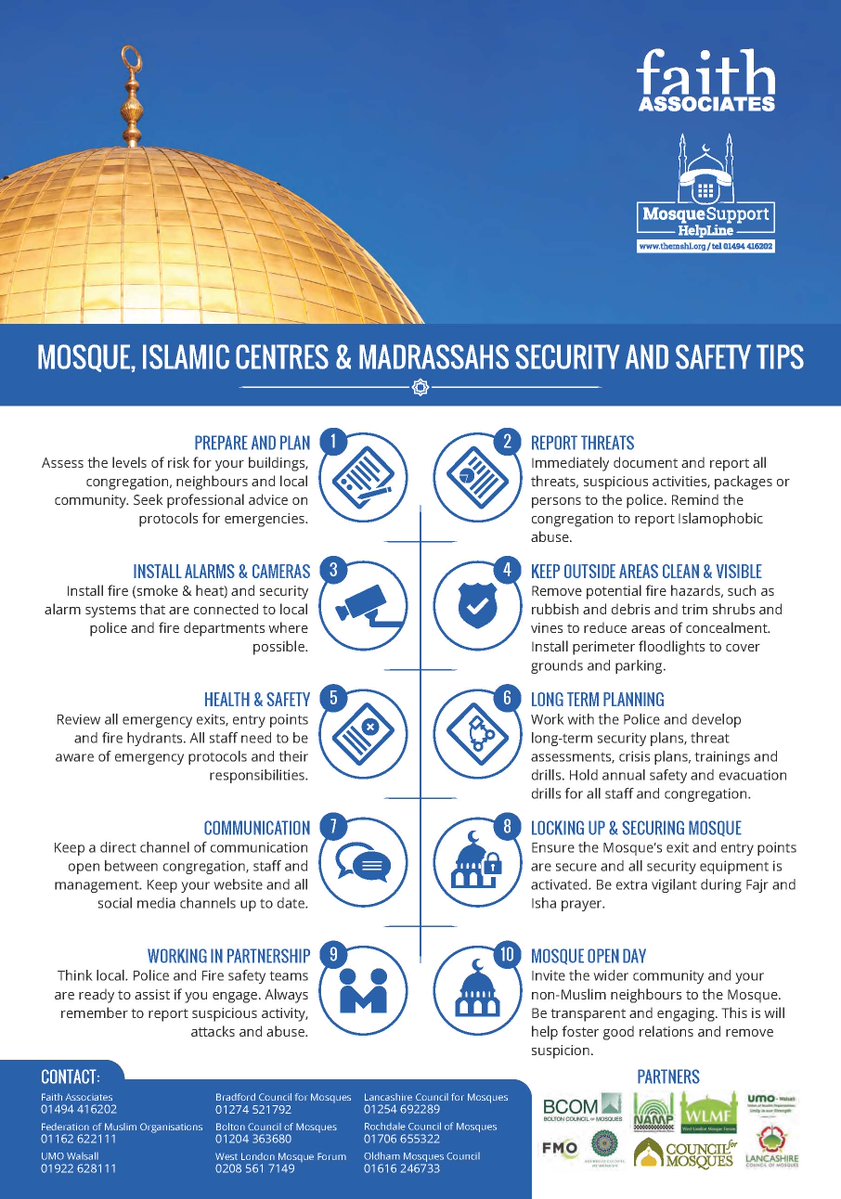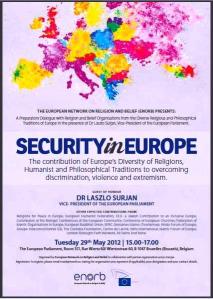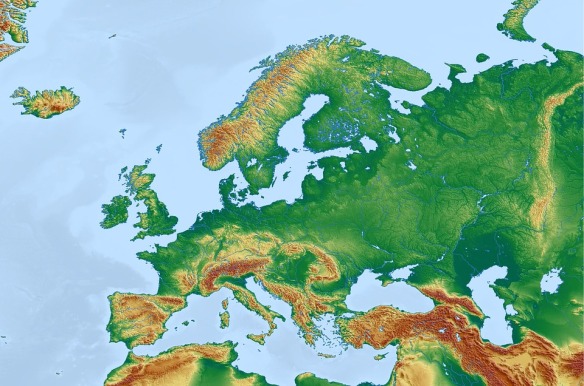
Please visit our Brexit page for information on Brexit.
BREXIT BRIEFING
Local places of worship are often a trusted source of information & support for their members and also for the wider community. They can be a port in a storm and are hugely important for people’s welfare. Their buildings and social networks can be put to good use at very short notice. There are roughly 200 places of worship in each borough.
Preparing for Brexit builds our capacity to fulfil this role. It encourages the public sector, churches, mosques, gurdwaras, synagogues & temples to be in touch and to
- bring together local residents
- resist any negative impact on community relations
- support the vulnerable
- share information
As the date for leaving the EU changes, LBFN may organise a third Brexit meeting in central London for places of worship to get the latest information and to share expertise and concerns.
We will post new material here as it becomes available. Scroll down for links & documents.
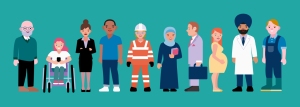
Read the government’s No-Deal Readiness Report here. It says
“The United Kingdom is getting ready to leave the European Union on 31 October 2019. While the Government would prefer to leave with a deal and will work to the final hour to achieve one, we are prepared to leave without a deal in order to respect the referendum result.
If we leave without a deal, the Brexit readiness report includes details of the Government’s work to make sure that citizens and businesses are ready for Brexit on 31 October.”
NCVO has published “What a No Deal means for Charities“, much of which is applicable to places of worship.
Look at the government’s No–Deal Readiness Check, which asks a series of questions and then gives you the information that relates to your answers.
Our meeting at New Scotland Yard on 21 March brought us up to date on keeping safe and pointed us to more detailed sources of information. More links have been added to the list of resources below.
Our meeting at City Hall on 7 March brought together ideas on being prepared for 29 March, whatever the result of current negotions by the Government.
- Renew contact with key people in your borough in case you need to get in touch quickly:
-
- Local police – find your Safer Neighbourhoods Team by entering your postcode. Get in touch, introduce yourself, exchange contact details.
- Borough Resilience Forum – dial your Council’s switchboard or email your local Emergency Planning Officer. Borough email details are listed here. Introduce yourself and ask if there are updates on EU Exit. Make sure any vulnerable people in your community are included on your borough’s Risk Register.
- Local faith forum, so that places of worship can work together more easily. Details are listed borough by borough.
-
- Check you know where reliable information on emergencies can be found on Twitter:
- Refresh your knowledge on where to report hate crime and which organisations can help. Antisemitism & Islamophobic hate crime has been rising & this may continue. Be vigilant. Always report hate crime to the Police, or via a third party which may also offer support such as:
- Think of ways to counter the negative environment by bringing local people together, building trust, sharing skills and supporting those whose first language is not English, non-working carers, people living alone, etc.
- Support applicants for settled status (see links below).
- Keep a look-out for anxious people, direct them to sources of information and offer neighbourly support.
- Food: there may be less choice, but food shortages are not expected.
- Learn some upstander skills.
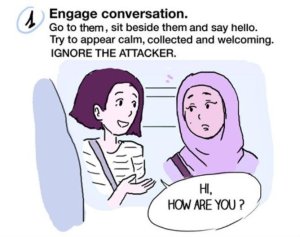

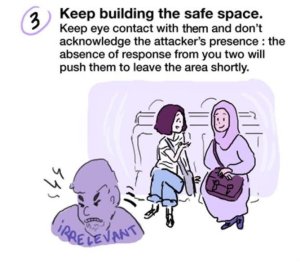
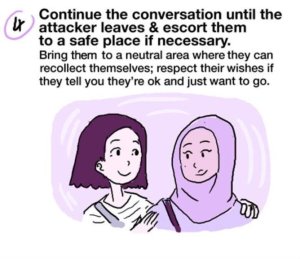
Here are all the upstanding advice pictures on one sheet.
This video is from the USA, but Stop Hate UK provides training in London.
USEFUL LINKS
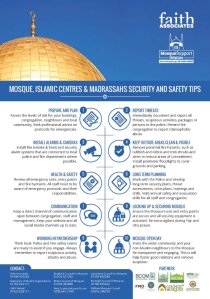
Faith Associates: Mosque Security & Safety Tips
The Mosque Security & Safety Tips have been developed to aid Management Committees in protecting the sacred institution. The Mosque as a institution is the central body of the Islamic community. Maintaining the Mosque’s safety and ensuring its protection is one of the most important things for a management committee.
Community Security Trust: Security Procedures for Places of Worship
This security guide was originally designed by the Community Security Trust (CST) in 2014 at the request of the Department for Communities and Local Government and Police, to assist mosques in Bradford that were affected by far right extremist activity.CST is a registered charity that gives security advice and provision, free of charge, for UK Jewish communities and for the benefit of wider British society. This guide has been updated in the aftermath of several terrorist attacks throughout 2017 and was distributed to the Muslim community following the Finsbury Park attack. The guide is intended for clergy, staff, management committees and volunteers when considering security for places of worship and other faith community premises.
 Ecclesiastical Insurance Terrorism Checklist for small to medium sized places of worship
Ecclesiastical Insurance Terrorism Checklist for small to medium sized places of worship
It is appreciated that the concept of absolute security is almost impossible to achieve in combating the threat of terrorism. However, it is possible by following this checklist to reduce the risk of attack as low as reasonably practicable. It is important that your worshippers and visitors understand the potential threats of terrorism to your place of worship.
Centre for the Protection of National Infrastructure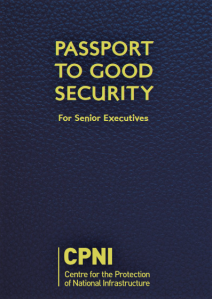
The Passport to Good Security remains one of the best resources for places of worship. It is intended for business leaders but is useful for any organisation which has a building and a network of people using it. Hard copies are hard to come by, but here is the pdf.
Advice from the Government on reporting and being aware of unusual activity on our streets, in shops.
National Counter Terrorism Security Office
Advice, including some short videos, on staying safe, crowded places guidance (such as places of worship) and Run Hide Tell.

Prepare for EU Exit: businesses & citizens.Leaving the EU means a number of changes that will affect businesses and individual citizens.Use the information on this site to find out how to prepare and the steps you may need to take.
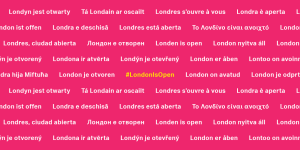 EU Londoners Hub for EU citizens living in London. Further support and advice – borough by borough listings of advice centres.
EU Londoners Hub for EU citizens living in London. Further support and advice – borough by borough listings of advice centres.
 Brexit Business Support Hub for small to medium sized businesses. Do you import or export to the EU? If there’s a no-deal Brexit, you’ll need to register for an EORI number to continue exporting and/or importing within the EU. You can register for an EORI number here
Brexit Business Support Hub for small to medium sized businesses. Do you import or export to the EU? If there’s a no-deal Brexit, you’ll need to register for an EORI number to continue exporting and/or importing within the EU. You can register for an EORI number here
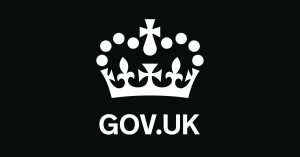 EU Settlement Scheme: Community leaders’ toolkit. The community leaders toolkit equips community groups and local authorities with the right tools and information to support EU citizens and their families to apply to the EU Settlement Scheme.
EU Settlement Scheme: Community leaders’ toolkit. The community leaders toolkit equips community groups and local authorities with the right tools and information to support EU citizens and their families to apply to the EU Settlement Scheme.
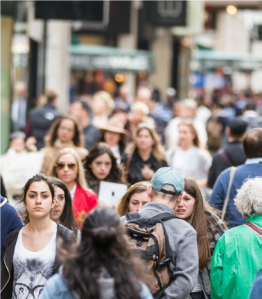 Support for People Affected by Terrorist Attacks. Download a leaflet with information on where to seek advice and assistance following a terrorist attack in the UK. From victim support to handling the media, there are links to relevant organisations.
Support for People Affected by Terrorist Attacks. Download a leaflet with information on where to seek advice and assistance following a terrorist attack in the UK. From victim support to handling the media, there are links to relevant organisations.
 EU Settlement Scheme: Community leaders’ toolkit. The community leaders toolkit equips community groups and local authorities with the right tools and information to support EU citizens and their families to apply to the EU Settlement Scheme.
EU Settlement Scheme: Community leaders’ toolkit. The community leaders toolkit equips community groups and local authorities with the right tools and information to support EU citizens and their families to apply to the EU Settlement Scheme.

Handling Media Attention after a Major Incident. Dealing with the media can sometimes be distressing and daunting. It is your decision whether or not to speak to journalists. While it may not feel like it, you are in control of this. Remember if you do not want to, you don’t have to. Download tips.
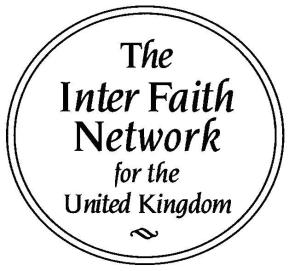 Looking after one another: the safety and security of our faith communities. Practical pointers from the Inter Faith Network for the UK in responding jointly to attacks on places of worship; working for calm in times of tension; and working to build and strengthen good inter faith relations.
Looking after one another: the safety and security of our faith communities. Practical pointers from the Inter Faith Network for the UK in responding jointly to attacks on places of worship; working for calm in times of tension; and working to build and strengthen good inter faith relations.
 Government’s Partnership Pack for businesses to prepare for a no deal exit. A high-level guide & links to processes and procedures that are likely to apply to cross-border activity between the UK and the EU in a no deal scenario.
Government’s Partnership Pack for businesses to prepare for a no deal exit. A high-level guide & links to processes and procedures that are likely to apply to cross-border activity between the UK and the EU in a no deal scenario.
 Universities No deal implications for universities. Sets out the range of implications and mitigations. Read Universities UK’s recommendations for government and universities in the event of a ‘no deal’ Brexit as a PDF.
Universities No deal implications for universities. Sets out the range of implications and mitigations. Read Universities UK’s recommendations for government and universities in the event of a ‘no deal’ Brexit as a PDF.
 Settled and pre-settled status – Government advice for EU citizens and their families. If you’re an EU, EEA or Swiss citizen, you and your family will be able to apply to the EU Settlement Scheme to continue living in the UK after 30 June 2021. If your application is successful, you’ll get either settled or pre-settled status. The EU Settlement Scheme will open fully by 30 March 2019. You may be able to apply now if you meet the criteria.
Settled and pre-settled status – Government advice for EU citizens and their families. If you’re an EU, EEA or Swiss citizen, you and your family will be able to apply to the EU Settlement Scheme to continue living in the UK after 30 June 2021. If your application is successful, you’ll get either settled or pre-settled status. The EU Settlement Scheme will open fully by 30 March 2019. You may be able to apply now if you meet the criteria.
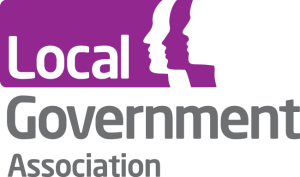 Brexit Advice Hub for Local Government. Many local authorities will be preparing plans for different Brexit scenarios and may have received different advice and communications from a variety of sources. For this reason, we have compiled useful national advice, sorted by topic area, in one place.
Brexit Advice Hub for Local Government. Many local authorities will be preparing plans for different Brexit scenarios and may have received different advice and communications from a variety of sources. For this reason, we have compiled useful national advice, sorted by topic area, in one place.
 Guidance on how to prepare for Brexit if there’s no deal. From driving to workplace rights, find the information you need.
Guidance on how to prepare for Brexit if there’s no deal. From driving to workplace rights, find the information you need.
If you have further information for local places of worship and communities on preparing for 29 March and EU Exit, please send it to LBFN. Thank you.
Archive
ENORB’s AGM 2017 will take place on Thursday 29 June at Centre Espaces, 40, Avenue de la Renaissance, 1000 – Brussels. Details tbc.
Reception in London for visitors from Berlin Monday 30 January 2017 at LBFN’s offices at Collaboration House, 77 Charlotte Street, W1T 4PW
- Dr Thomas Schimmel, Director, 1219 Religions- und Kulturdialog, Berlin
- Pasha Shah, Integration and Faith Division, Department of Communities and Local Government
- Katharina Smith-Müller, Inter Faith Advisor, Catholic Bishops’ Conference of England and Wales
- Dr Thomas Wipf, Swiss reformed theologian and Moderator, European Council of Religious Leaders
- Pastor Peter Jorgensen, Community of Evangelical Free Churches, Berlin
- Elizabeth Harris-Sawczenko, Director, Council of Christians and Jews, UK
- Representative of Hartmut Rhein, Commissioner for Churches and Religious and Philosophical Communities, Mayor’s Office, Berlin (tbc)
- Catriona Robertson, Convener, London Boroughs Faiths Network and Interim Director, Christian Muslim Forum
“Interfaith, Cities and Government” is a new project launched by the European Council of Religious Leaders (Religions for Peace), bringing together interfaith leaders and local governments from European cities, to share best practice, exchange knowledge, and explore collaboration. The visit to London follows a meeting at Berlin Town Hall in October 2016 which included London Boroughs Faiths Network, Faiths Forum for London, the Metropolitan Police and the European Council of Religious Leaders.
Reconciling Values, Religion and Human Rights
ENORB Seminar 9 will take place in Brussels on 13-14 September. If you plan to attend, register here and download the draft programme.
It will focus especially on those aspects of Human Rights, including some key components of the EU Charter of Fundamental Rights, which have come under attack by far-right groups in parts of Europe and also regrettably, by some groups, including members of the hierarchies, of the key European religion or belief (R&B) traditions. ENORB’s support to Europe’s religious minorities – particularly those who wear some form of religious dress or symbol – and our support for solidarity between religion and belief and LGBT communities, have also been the subject of attack. This seminar will be an opportunity to exploring these challenges, and to reaffirm the implications of human rights for all.
The aims of the seminar will be both exploratory and practical:
- To identify shared and positive values which can be subscribed to by all R&B traditions across Europe in all its diversity
- To build campaigning partnerships between R&B and LGBT organisations for local action to combat hate crime and implement key fundamental rights which are under attack in several parts of Europe.
Register here to join an excellent line-up of speakers and to meet participants from across Europe.
31 May 2016 at Centre Espaces, 40, Avenue de la Renaissance, 1000 – Brussels
European Network on Religion & Belief with CEJI – A Jewish Contribution to an Inclusive Europe.
- James Barnett – COGREE (Coordinating Group for Religion in Education in Europe), and former chair, Council of Europe Working Group on the Religious Dimension of Intercultural Dialogue.
- Paul Weller– University of Derby “Religious Education in Changing Social Contexts”
- Szilvia Kalman – European Commission DG Education and the follow up to the Paris Declaration of Education Ministers
- Armand Benizri – Inspector of Religious Education Belgium “Debates, opportunities and curricular changes in the Belgian public schools”
- Communities: Anne de Potter (Beth Hillel Synagogue/Cercle d’Eveil); Clément Dumas (Etterbeek Convictions en Dialogue) ; Mustapha Chairi (Reflections from Schaerbeck)
- Adult Education: Robin Sclafani (CEJI-Belieforama (Europe)), Raheed Salam (All Faiths and None (AFAN UK))
- Schools : Marine Quenin (France- video), Dr. Helen Brown – Ecole International le Verseau (Belgium); Armand Benizri -Inspector for Jewish Education in Belgian French Community Public Schools; Stephanie Lecesne – CEJI and in-service professional development training for teachers
- Youth Sector: Mo & Moos (Netherlands); Sam Grybowski – Coexister (France)
30 May 2016 at Centre Espaces, 40, Avenue de la Renaissance, 1000 – Brussels
Keynote Speaker: Professor Erica Howard, responses from speakers from perspectives of religions, and from humanism, followed by questions and discussion.
Workshops:
- Joint Responses to Hate crime from Religious, Secular and Human Rights organisations
- Building Solidarity on Human Rights
- Religious/Belief and LGBT organisations
- Religion/Belief and Women’s Rights
Plenary: next steps
Statement after Brussels attacks
ENORB, the European Network on Religion and Belief, sends its heartfelt sympathy to the victims of the horrific attacks here in Brussels and their families; our thoughts and prayers extend to the many people across Belgium affected by these tragic events through ties of family and friendship.
These atrocities are clearly designed to strike at the heart of Europe and to directly threaten the message of peace and stability represented by the European institutions. We join in the universal response of religions and humane organisations: we condemn violence at all times, and all attempts to use religion or ideology to justify terrorism and violence.
We recognise the importance of security for all peoples of Europe, whatever their religious, ethnic or national origin, including recent refugees from war in the Middle East. But we also recognise and condemn all who seek to use these events, as well as the refugee crisis, to foment racism and xenophobia which further increase the attacks on religious minorities across Europe.
We grieve this senseless suffering and loss of life, we condemn unreservedly such terrorist violence, and we stand united in our determination to build societies that are open, free and respectful of diversity.
23 March 2016
Manifesting Religion or Belief: A Human Rights Perspective
Seminar 7 at the European Parliament on 17 November 2015 09:00 – 16:45
- Kishan Manocha, ODIHR Senior Adviser on Freedom of Religion and Belief
- Professor Eugenia Relano Pastor, Complutense University, Madrid
- Willy Fautre, Human Rights Without Frontiers
- Keith Porteous Wood, National Secular Society UK
- Karim Chemlal, Fédération des Organisations Islamiques d’Europe
- Martin Gurvich, Hindu Forum of Europe
- Mejindarpal Kaur: United Sikhs
- Patricia Duval: Attorney at Law, Paris
European Network on Religion & Belief AGM 2015
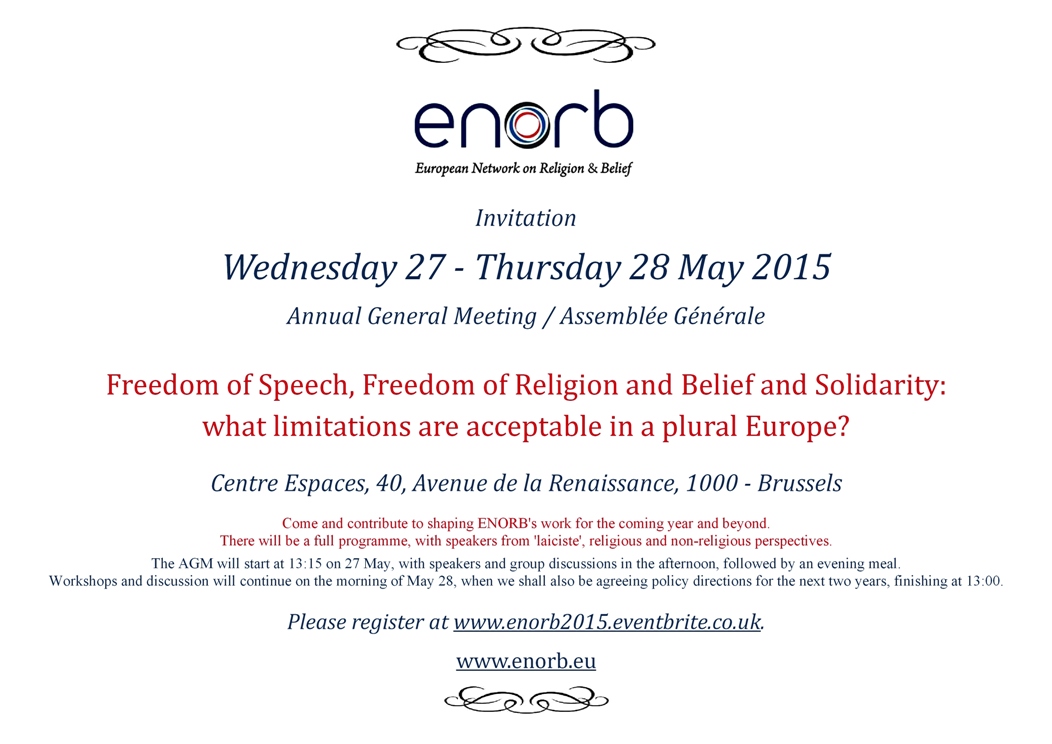
Farewell to Dr Kishan Manocha
ENORB UK is saying farewell to Dr Kishan Manocha on 12 May 1pm – 2.30pm at Europe House, 32 Smith Square, SW1P 3EU. We will hear from Dr Manocha about his new posting at OSCE and his thoughts on the value of freedom of speech and of religion & belief.
We will also discuss stakeholder questions ahead of the European Commission’s Annual Colloquium on Fundamental Rights on the topic of Tolerance and respect: preventing and combating anti-Semitic and anti-Muslim hatred in Europe. Download the stakeholder questions here. Let LBFN know if you would like to join us (registration is essential in order to enter the building).
An ENORB meeting in Brussels took place on 26 March 2015, a joint event with ILGA-Europe on Equality for All – EU equality legislation against hate speech & discrimination on grounds of religion, belief, sexual orientation, gender identity and gender expression. Download the full programme here.
The last meeting of ENORB UK took place at Europe House, Smith Square, SW1P 3EU at 10am – 12 noon on Wednesday 12 November 2014. The event was part of Inter Faith Week 2014. Andrew Copson, CE of the British Humanist Association, spoke on
Humanism, Laïcité, Atheism, Secularism across Europe: how do we work together across religious & belief traditions for fair treatment for all?
Download the flyer here.
LBFN has been making links with similar groups across Europe since 2009. As a follow-up to our Brêakfåst in Mültifaitħ Eŭrőpe in November 2010, we gathered people from over 30 organisations for lunch at Europe House in London on 28th November 2011. Download the programme here. We continued this series with Afternoon Tea in Multifaith Europe in November 2012 and a reception at Europe House as part of our 10th Anniversary celebrations in November 2013.
Since January 2011, we have been part of a growing group of grassroots organisations across Europe working towards establishing the European Network On Religion and Belief. ENORB is now registered in Brussels (LBFN’s Convener sits on its Executive Board) and its aims are:
- To bring religious and non-religious groups together to work in partnership and in dialogue with the European Union, on EU policy priorities, with particular reference to the ‘economic, social and territorial cohesion’ of Europe.
- To build a common European Platform to combat discrimination and prejudice, and promote harmony and shared values between different religious and non-religious traditions, through joint activities including dialogue, exchanges and social actions for the common good.
- To develop a shared language between religions, philosophical organisations, and politicians on key issues and policies for the future of Europe.
ENORB has organised five seminars in Brussels, two of which have taken place at the European Parliament:
Europe’s Economic Crisis – November 2012
Fair Treatment for All – March 2013
Joint seminar with the International Lesbian & Gay Association – Europe – September 2013
Is wearing articles of faith a threat to European democracies? December 2013
ENORB’s first AGM took place on 21st May 2013 in Brussels and the second was held on 17-18 May 2014 (programme here).
Three gatherings in London have been chaired by LBFN to bring together an ENORB-UK group linking to European groups and providing an informal space for sharing information and ideas on religion and belief in the UK. The last event was held at Senate House, University of London, and focused on the latest research on religion and belief.
If you would like to add your ideas and suggestions, please leave a comment here on the blog or contact LBFN’s convener.
Please get in touch if you’re interested in networking with intercultural practitioners across Europe – particularly those who, like LBFN members, are involved in developing public policy, at a local (and, in this case, EU) level.
The EU’s Lisbon Treaty sets out its responsibilities in relation to religion and belief groups. Article 17 of the Treaty states
- The Union respects and does not prejudice the status under national law of churches and religious associations or communities in the Member States.
- The Union equally respects the status under national law of philosophical and non-confessional organisations.
- Recognising their identity and their specific contribution, the Union shall maintain an open, transparent and regular dialogue with these churches and organisations.
Roughly speaking, (1) refers to religious groups and (2) refers to humanist, atheist & philosophical groups.
Here are some links – leave a comment below if you have come across others which would be useful.
British Council – Our Shared Europe
COMECE Commission of the Bishops’ Conferences of the European Community
CEC Conference of European Churches
At Home in Europe (Open Society Foundations)
European religious leaders meet EU leaders May 2012
European Commission, Bureau of European Policy Advisers – Dialogue with religion, churches and communities of conviction.
SERIC Week of Muslim-Christian Meetings across Europe
